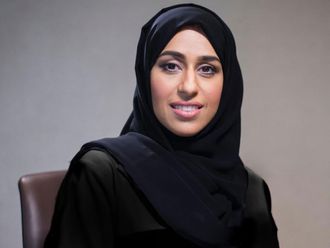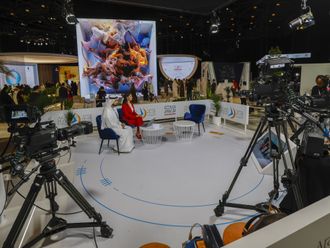Abu Dhabi: The UAE has taken major steps to fight human trafficking with the amendment of Federal Law 51 to better safeguard trafficking victims in accordance with the Palermo Protocol ratified by the UAE in 2009, a senior official said yesterday.
Dr Anwar Mohammad Gargash, Minister of State for Foreign Affairs, said the commitment of the UAE’s legal institutions has led to sustained increase in awareness about the issue over the last few years.
“While only 10 cases were reported in 2007, the figure doubled to 20 cases in 2008, went up to 43 in 2009, 58 in 2010, reduced to 37 in 2011 and increased to 47 in 2012,” Dr Gargash said as he launched the UAE Annual Human Trafficking Report 2012-2013 at the Jumeirah Hotel In Etihad Towers .
Dr Gargash, also Chairman of the National Committee to Combat Trafficking, added the measures adopted by the UAE against such crimes are established on the foundations of legal mechanisms and social support, and implemented in coordination with a number of relevant institutions.
“Based on the constructive criticism and support from our partners and the international community, the UAE is determined to take forward its programmes on combating human trafficking,” Dr Gargash said in a speech, read out by Dr Abdul Rahim Al Awadi, assistant Foreign Minister for Legal Affairs.
The UAE is implementing a major programme in 2013 to expand awareness about combating human trafficking at airports. As part of this plan, the country will host some events related to the Arab initiative to build the capacity of workers in the field of combating human trafficking.
According to the report, some 47 cases of human trafficking were heard last year, involving 149 suspects and 75 victims, in which there were 31 convictions involving 91 accused.
Describing the report as the first of its kind as per the new national strategy endorsed by the National Committee to Combat Human Trafficking in 2012, Dr Gargash said it was based on ‘Five Ps’ of prevention, prosecution, punishment, protection and promotion (of international cooperation), and in line with the international best practices in this field.
All along, the UAE’s efforts have been proactive, which included broad steps such as presenting a comprehensive periodic human rights report before a panel in Geneva, and working to facilitate the visit of the Special Rapporteur of the United Nations on trafficking, particularly women and children, the minister added.
The annual report is part of a new approach that the National Committee to Combat Human Trafficking seeks to achieve to exchange best practices and information with members of the international community, and to highlight its efforts to limit these crimes.
Commending the international efforts to fight human trafficking, Dr Gargash said the UAE is fully aware of the multiple challenges and complexities facing the countries and governments around the world in tackling such crimes. He said the UAE is determined to address all the concerns related to this issue and will maintain a constructive dialogue with all the members of the international community to eliminate human trafficking.
Dr Al Awadi criticised an International Labour Organisation’s (ILO) study into the treatment of workers in the UAE as “biased”.
“The UAE has taken several steps to facilitate workers’ change of jobs or transfer of sponsorship,” Al Awadi said as he was commenting on the ILO report Tricked and Trapped, presented this recently in Jordan.
The UN agency highlighted in particular the visa sponsorship system between in-country employers and workers that ILO calls “inherently problematic” because it creates an unequal power dynamic between the employer and the worker.
Dr Al Awadi said each country has a right to adopt whatever system it deems suitable .











